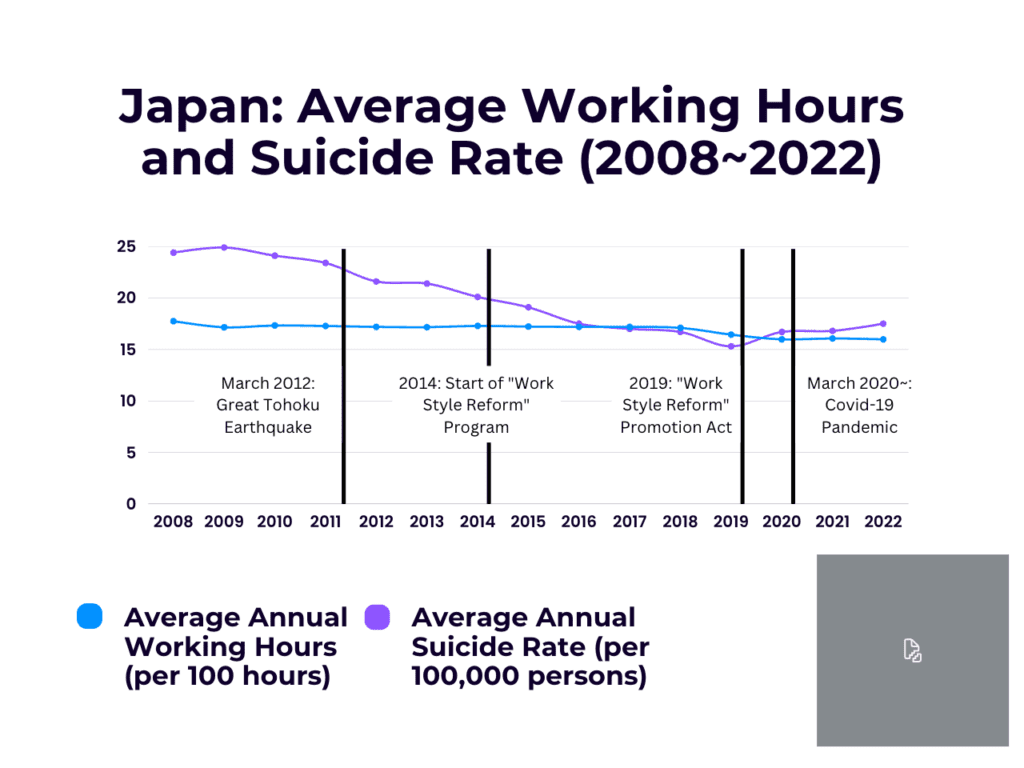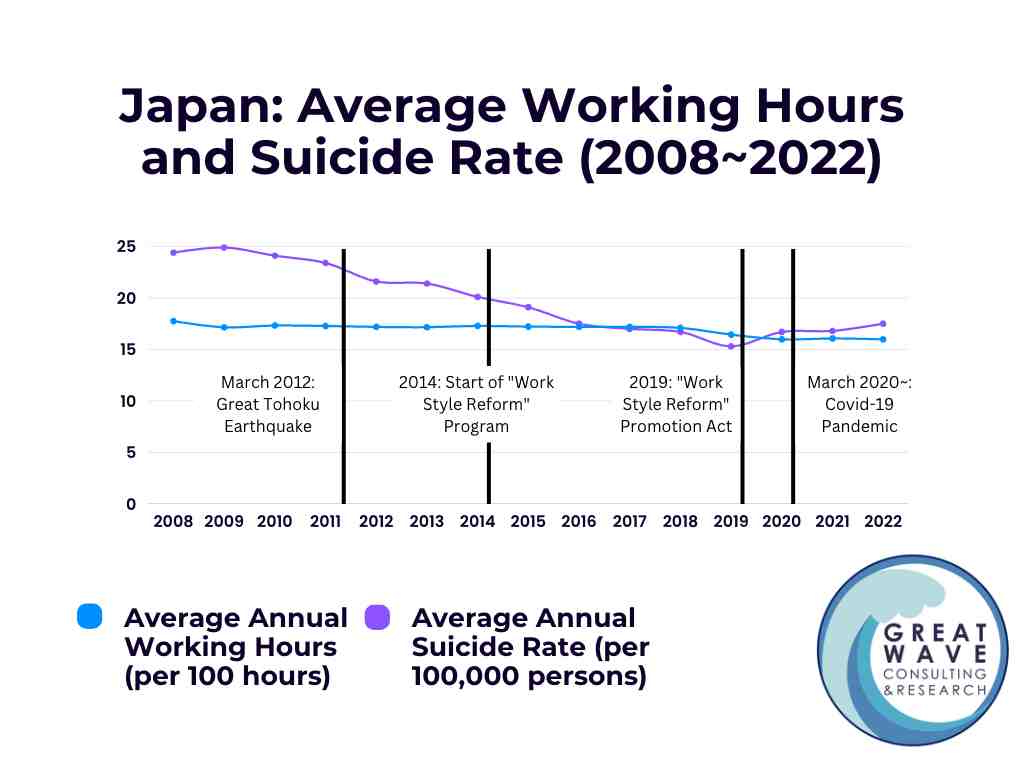Introduction
Growing up in the 1980s, it seemed like Japan was often in the news. Often news reports emphasized Japan’s performance in academic subjects, such as mathematics, or how working or attending school six days a week was “normal.”
Japan’s overwork culture has drawn international attention due to its association with burnout, mental health issues, and even “karoshi” (death from overwork).
It is essential to consider the education system’s fundamental role in cultural and social development, which influences work environments, business customs, social expectations, and consumer behavior.
In this article, we will explore the impact of the overwork culture on businesses, employees, and consumers, the role of the education system, and the importance of market research in navigating the complex landscape of the Japanese market.
Overwork Culture in Japan: A Snapshot
Statistics reveal the magnitude of Japan’s overwork problem. According to the Japanese Ministry of Health, Labor, and Welfare, there were 246 cases of “karoshi” and 498 cases of “karojisatsu” (suicide due to overwork) in recorded in 2020.
Japanese workers also clock more hours on average than their peers in many developed countries. A 2020 study showed that 8.8% of employees in Japan worked over 60 hours a week, indicating a deeply ingrained culture of overwork.

Impact of Covid-19 on Work Culture
Thinking back to the early days of the Covid-19 pandemic, things were normal in January 2020, and then there was the cruise liner that was quarantined in Yokohma, followed by toilet paper shortages and a panic buying of necessities.
As a parent, our children’s schools were suddenly closed, and there was no clear idea at the time when things would return to normal.
At
With vaccines
forced many Japanese companies to adopt remote work and teleworking practices, which allowed for more flexible work schedules and the potential for improved work-life balance.
According to a June 2020 survey by the Ministry of Internal Affairs and Communications, 31.5% of workers in Japan were working remotely. However, overwork culture remains a challenge, as challenges associated with remote work and digital infrastructure persist.
The Education System and Overwork Culture
Japan’s education system plays a significant role in fostering a vicious cycle of overwork and normalization.
As a high school exchange student in Japan in the late 1990s, I first-hand witnessed the educational environment and pressure. Despite curriculum changes over the past decades, Japan has struggled to keep pace with other OECD members regarding educational reform until the Covid-19 pandemic.
Japan’s education system is an excellent example of social inertia. While there have been discussions and pilot projects to change Japan’s education policy, resistance impacts the ability to change.
Over the years, there has been a slow shift from a rigid curriculum focused on rote memorization to developing the skills to survive the current age of VUCA (volatility, uncertainty, complexity, and ambiguity) through independent, communication, and critical thinking skills, such as through STEM/STEAM programs or courses to improve communication skills.
While students can pick up new skills fairly quickly, we notice that systemic, cultural foundations, including government, teachers, administrators, and parents, often find safety and ease in maintaining the status quo.
Schools foster a sense of responsibility toward the group’s success, which continues to prioritize the needs of a firm or organization over personal well-being in the workplace. While those from individualistic societies may perceive Japanese society as emphasizing collectivist values and group harmony, many Japanese consider it normal as a product of their environment. As individuals, the members of Japanese society are on a social tightrope; while today’s youth are increasingly individualistic than previous generations, there is significant pressure to fit in and conform.
Extracurricular activities in Japanese schools, such as sports clubs or cultural clubs, demand significant time and commitment, instilling a solid work ethic from a young age and cementing the role of seniority-based structures. I did kendo (fencing) as an exchange student in Tokyo. My classmates were on the tennis, baseball, and soccer teams. There was a clear seniority-based hierarchy; for example, first-year students would clean the floors or fetch stray tennis balls, while second and third-year students did not.
For university students, the highly competitive job-hunting process, known as “shūshoku katsudō,” adds to the stress of securing a job before graduation, contributing to the acceptance and expectation of long working hours and commitment to an employer.
Impact on Business Behavior
- Decision-making Process:
- The collectivist culture and strong emphasis on group harmony can lead to slower decision-making processes in Japanese companies. Seeking consensus and avoiding conflict may result in lengthy discussions and deliberations, impacting their ability to adapt quickly to market changes.
- Risk Aversion:
- The education system’s focus on conformity and adherence to established norms can result in more risk-averse businesses, potentially hindering competitiveness and innovation. Despite being the third-largest economy, Japan’s ranking of 20th in the Global Innovation Index 2021 demonstrates the challenges firms face in fostering innovation.
- Employee Retention and Loyalty:
- The lifetime employment system fosters dedication and commitment. While beneficial for stability and continuity, it may encourage employees to seek new opportunities, experiences, or learning – contributing to stagnation in innovation and growth.
- Work-life Balance Challenges:
- The overwork culture can lead to negative consequences for employees, including burnout, health issues, and decreased job satisfaction. In 2019, a survey conducted by Expedia revealed that Japanese employees used only 50% of their paid leave, indicating a reluctance to take time off from work.
Impact on Consumer Behavior
- Quality and Service Expectations:
- Japanese consumers have high expectations for product quality and customer service, valuing reliability, attention to detail, and a commitment to customer satisfaction. Japan’s reputation for producing high-quality products, such as automobiles and electronics, exemplifies this preference.
- Conformity and Brand Loyalty:
- The emphasis on conformity may make Japanese consumers more loyal to well-known brands and less open to trying new or unfamiliar products, making it harder for new entrants to penetrate the market. Market research firm GlobalWebIndex reported in 2020 that 56% of Japanese consumers preferred buying from brands they know and trust, highlighting the significance of brand loyalty in this market.
- Work-life Balance and Consumer Habits:
- The overwork culture can impact daily lives, routines, and habits. Long working hours and limited leisure time result in a preference for convenience-oriented products and services. The popularity of convenience stores, such as 7-Eleven and FamilyMart, and the growing demand for delivery services demonstrate this trend.
- Focus on Cultural Values:
- It is essential to consider cultural preferences when considering customer segmentation. While consumer preferences can be broad, cultural values impact awareness and purchasing decisions for different products and services.
Successful firms introduce products and services that understand and align with cultural values. At the same time, while cultural values may create challenges for international brands looking to enter and expand, there are also opportunities – provided that products and services cater to consumer preferences. Market research helps firms to understand the needs and preferences of B2B and B2C consumers.
The Role of Market Research
Market research is essential for firms looking to understand the unique factors influenced by Japan’s overwork culture and its impact on business and consumer behavior. By conducting thorough research, companies can develop effective strategies for navigating the complexities of the Japanese market and achieving success. Some key areas of focus for market research include:
- Cultural Analysis:
- Gaining a deeper understanding of Japanese culture, including the values, beliefs, and social norms that shape business and consumer behavior, is crucial. Examining the impact of the education system, work culture, and collectivist values on decision-making processes, risk tolerance, and consumer expectations is vital.
- Consumer Behavior Studies:
- Conducting surveys, interviews, and focus groups can provide valuable insights into Japanese consumers’ preferences, habits, and attitudes. These insights help identify and monitor trends and drivers in consumer behavior, such as preferences for convenience-oriented products, high-quality, ease of use, or price sensitivity.
- Market Segmentation:
- Identifying specific segments within the Japanese market that may be more receptive to their products or services can help firms tailor their offerings and marketing strategies to better appeal to their target audience.
- Competitor Analysis:
- Examining the strategies and performance of competitors in the Japanese market can provide insights into successful approaches and potential pitfalls. Understanding the competitive landscape can help companies better position themselves for success and avoid common mistakes.
- Product Testing and Adaptation:
- Identifying potential cultural or practical barriers to adopting their products or services in Japan can help firms make necessary adaptations to suit the local market better and increase the likelihood of success.
- Trends and Emerging Opportunities:
- Keeping a close eye on emerging trends and opportunities can help firms capitalize on new market developments and consumer preferences. In line with the OECD’s 2030 plan and sustainable development goals (SDGs), sustainability, digital transformation (DX), and the needs of an aging population are increasingly important in the Japanese market.
COVID-19 Impact and Considerations
The COVID-19 pandemic has significantly impacted the Japanese market, presenting challenges and opportunities for businesses. The shift to remote work, the adoption of digital technologies, and changing consumer habits have accelerated the need for companies to adapt and innovate.
- Remote Work and Work-life Balance:
- The COVID-19 pandemic has forced many Japanese companies to adopt remote work, which could help address the overwork culture and improve the work-life balance for employees. While there has been a slow shift towards more flexible work arrangements, the pandemic may have accelerated the trend. Companies should monitor the impact of remote work on employee satisfaction, productivity, and innovation.
- Digital transformation (DX):
- The pandemic has also accelerated digital transformation efforts in Japan. Companies must invest in digital technologies to improve their operations, reach customers, and remain competitive. DX has four phases, which we will discuss in a future article on DX and the 2025 digital cliff. As of 2022, most publicly listed firms were behind their strategic targets, and SMEs were even further behind.
- Changing consumer habits: COVID-19 has affected consumer habits and preferences, with an increased focus on health, safety, and convenience. Companies must consider these changes when developing products and services and ensure their offerings cater to evolving consumer needs. For example, there may be a growing demand for contactless payment options, online shopping, and home delivery services.
- Supply chain disruptions: The pandemic has exposed vulnerabilities in global supply chains. Firms may need to reevaluate their supply chain strategies to mitigate risks and ensure business continuity. This could involve diversifying suppliers, increasing inventory levels, or adopting new technologies to improve supply chain visibility and resilience.
- Mental health considerations: The pandemic has heightened the importance of mental health and well-being for employees and consumers. Companies should prioritize employee mental health and well-being initiatives and consider how their products and services can address mental health concerns among consumers.
Conclusion
In conclusion, Japan’s overwork culture is deeply rooted in the education system and branches into social, business, and consumer behavior. The emphasis on collectivism, group harmony, and dedication to work influences decision-making processes, risk tolerance, and consumer preferences. The COVID-19 pandemic has presented new challenges and opportunities for businesses in Japan, accelerating the shift to remote work, digital transformation, and changes in consumer habits.
To succeed in the Japanese market, firms must understand these unique cultural factors and the challenges and opportunities they present, especially in light of the pandemic. By conducting thorough market research and keeping a close eye on emerging trends, companies can develop effective strategies to navigate the complexities of the Japanese market, catering to the needs and preferences of Japanese consumers while adapting to the local business environment and the new normal brought on by the COVID-19 pandemic.
Businesses must stay updated on the latest data and insights related to Japan’s overwork culture, the education system, and the evolving market dynamics in response to the pandemic. By staying informed and adapting to these changes, companies can position themselves for success in Japan’s dynamic and competitive market.




